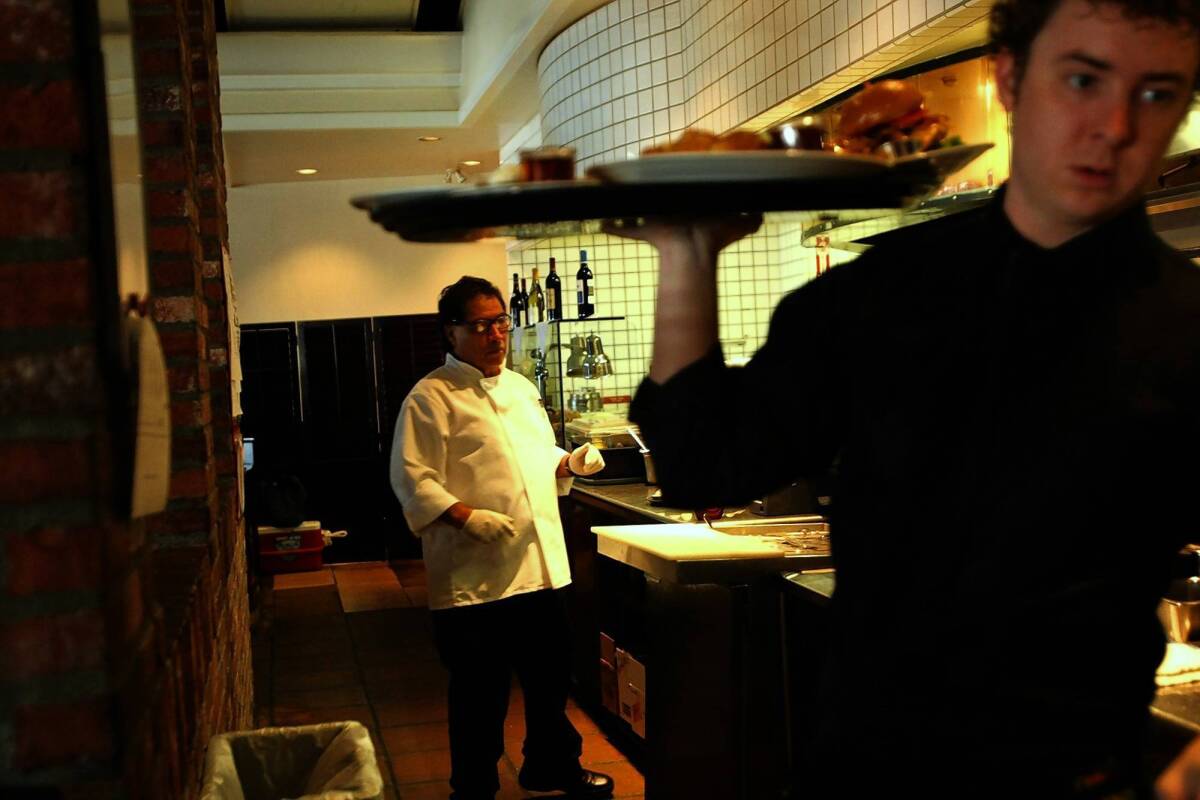Hamburger Hamlet still serving up his American dream

Each morning at 7, Marcelino Martinez arrives at the Hamburger Hamlet in Sherman Oaks.
Wearing a thick white chef’s coat, he inspects the fryers first — for the purity of the cooking oil and height of the flame.
This has been his routine for 43 years.
In this kitchen and many like it, the restaurant manager has trained hundreds of fellow Zapotec Indians from the highlands of Oaxaca, Mexico, to cook patty melts, onion rings and lobster bisque at El Hamlet.
Most have moved on, preparing German, Italian, French and California cuisine at various restaurants throughout Los Angeles.
But Martinez, a stocky 61-year-old with curly hair and large glasses, remains loyal to the job that changed his life.
“It’s what I’ve always done,” he said, peering into the fryer to spot its pilot light.
Martinez was 18 when he first entered the darkened dining room of a Hamburger Hamlet on Sunset Boulevard. His roommates had sent him to see Asael Gonzalez, who sent him to the Hamlet.
Gonzalez was the first of the Zapotecs to be hired by Marilyn and Harry Lewis, who started the chain restaurant in 1950. Impressed with his work ethic, the Lewises urged Gonzalez to find “mas amigos.” Martinez was one of them.
As he walked through the dining room that first day, Martinez recalled, he’d never seen so many black people in one place.
The first Westside restaurant to break the color barrier, Hamburger Hamlet was about to become a bellwether of another Southern California workforce shift: from black to Latino.
Martinez traded the 60 cents a day he’d earned working in the mountains of Oaxaca for 60 cents an hour at the Hamlet. “They paid you little, but it was stable,” he said. “You have money to be able to buy a nice shirt like anyone else. In Mexico, you have to work for months to get something like that.”
As blacks moved on to jobs in other industries, Martinez rose from dishwasher to cook. He didn’t mind that this was considered women’s work back in Oaxaca. He came early and stayed late, often working six days a week.
A caravan of young men beat a trail from isolated Sierra Juarez villages, without paved roads or electricity, to Los Angeles. They arrived knowing to look up Gonzalez. Like Martinez, they lived six or eight in one-bedroom apartments. They too showed up early and left late.
Soon, Hamburger Hamlet’s cheeseburgers and chicken salad were produced almost entirely by Zapotecs from villages such as Xochixtepec, Yalalag and Zoogocho.
“We took no breaks,” Martinez said. “We never asked for overtime, sick days. We were happy because they gave us jobs.” Zapotecs from other parts of Oaxaca learned the restaurant trade as well, working at smaller eateries in Santa Monica and Venice. But no restaurant in Los Angeles trained so many for so long as Hamburger Hamlet.
By the time he was 24, Martinez was director of the chain’s kitchens, hiring the young Oaxacans whom Gonzalez had brought in as dishwashers.
He had an expense account and drove around Southern California training aspiring Zapotec chefs, standing beside the fryers with men who hadn’t cooked a thing in their lives. Hot oil splattered as he taught them to tend French fries. He showed them how to use a knife “without cutting off their fingers.”
In the Hamlet’s heyday, Martinez said, the Zapotecs “felt good working as a team.”
Martinez also traveled to such places as Chicago and Atlanta to help open restaurants and train staffs. On one trip to Washington, D.C., he visited the White House.
But El Hamlet’s Zapotec Camelot began to crumble in 1986, when Congress granted amnesty to 3.2 million illegal immigrants — including most of the chain’s Oaxacan workforce. Longtime cooks started giving Martinez their two-week notices. He watched dozens depart for higher-paying jobs.
The next year, the Lewises sold the Hamlet chain — 24 restaurants by then — to an investment firm for $29 million. The menu changed.
Once, the lines spilled out the doors. Mexican Indian peasants clad in chefs’ coats filled the kitchens with shouts in Spanish and Zapotec as they raced to fix omelets, sausages, waffles and pancakes for a thousand people who showed up for every Sunday champagne brunch.
Now there are only four Hamlets left, two of them in Southern California. They retain their leather-upholstered booths but have added veggie burgers and gluten-free buns to the menu. There is a monthly “vegan day”; Sunday brunch is a shadow of what it once was.
Martinez paces a spacious and well-lighted Hamlet kitchen, still overseeing a few Zapotec chefs. But new hires are rare, and cooks long ago stopped needing his counsel.
His eyes dart across the dining room, dark as the day he entered but now often filled with customers about his own age.
It’s hard for him to picture how it used to be.
Gonzalez and his wife, who prepared chicken salad, rice pudding and ratatouille at the restaurant, retired and moved to Tecate, Mexico.
Over the years, Martinez became a U.S. citizen, married, raised a family and bought a house. Yet as owner after owner deserted El Hamlet, and a dozen restaurants offered him more money or benefits, he couldn’t bring himself to leave.
Martinez’s oldest son, Steven, went to college partly because a year of working at a Hamburger Hamlet taught him what he didn’t want to do. He now has a PhD and is the principal of John Burroughs Middle School. Another son is a middle school science teacher.
“The emotional deposit that you’ve put into a place, that builds up over time,” Steven Martinez said. “My dad has that sense of loyalty.”
What sustained Marcelino Martinez after he left the highlands of Oaxaca sustains him still: hard work. He’s taken just one sick day and a total of three months of vacation in 43 years.
“A lot of these young guys — 20, 30 years old — they can’t work like me,” he said. “I have a lot of energy. I’m happy at Hamburger Hamlet. When you’re happy in a job, why should you change?”
More to Read
Sign up for Essential California
The most important California stories and recommendations in your inbox every morning.
You may occasionally receive promotional content from the Los Angeles Times.










